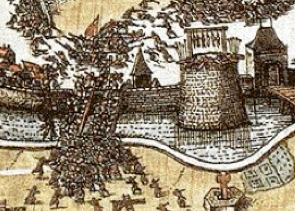 Last Wednesday evening–12.12.12–John Calvin’s cathedral in Geneva was filled with worshippers longing for fresh renewal and revival. The cathedral gathering was the culmination of five days of prayer and inspiration, including a two-day ‘school of restoration and reformation’.
Last Wednesday evening–12.12.12–John Calvin’s cathedral in Geneva was filled with worshippers longing for fresh renewal and revival. The cathedral gathering was the culmination of five days of prayer and inspiration, including a two-day ‘school of restoration and reformation’.
Jean-Claude Chabloz, pastoral worker at the Swiss parliament, opened the evening explaining the significance of 12 December in Geneva’s history. This was the date of an annual festival celebrating the defeat of the surprise attack by troops sent by the Duke of Savoy, during the night of 11–12 December 1602.
Called L'Escalade (from escalade, the act of scaling defensive walls), the celebrations recall particularly how a mother of 14 children poured steaming hot soup from the cauldron she was cooking on the unfortunate soldiers below, who were trying to storm the city gate. The resulting screams and shouts helped rouse the Genevois who rushed to the walls to successfully defend their city.
Since 1978, a road running race through the inner city has commemorated this ‘rush to the walls’, a highlight in the city’s annual calendar. The race was held Saturday a week ago, and costumed figures paraded through the streets. Shop windows were stocked with chocolate cauldrons for sale, filled with marzipan vegetables.
Jean-Claude told of the duke’s schemes to make wealthy Geneva his capital north of the Alps and to crush Protestantism. Sixty years previously, Calvin had brought the Reformation to Geneva, and the city had become famous throughout Protestant Europe as a city of refuge, ‘the city set on a hill’, a model of a nation built on biblical principles.
All this was threatened to be destroyed. But defeat obliged the Duke of Savoy to accept a lasting peace, and Geneva continued to be a city of great influence on both sides of the Atlantic.
Deliverance
Jean-Claude said that that morning in Bern he had asked a number of parliamentarians what they understood L’Escalade to be commemorating. Some said it was about living together, others that it was just a fun festival. Another said it was definitely not about religion. Only one person understood that it was about the deliverance of the city from a hostile attack and that the celebration was a specific thanksgiving to God. A contemporary song with 68 stanzas about L'Escalade became the city anthem, Jean-Claude explained, although only four are usually sung.
This song clearly celebrated the city’s deliverance and gave thanks to God. Europe could have been quite a different place had the duke’s plans succeeded, Jean-Claude concluded.
Miracle
Dr Daniel Juster, with whom I shared a platform at the two-day school, drew on his Jewish roots to explain a second layer of significance of 12 December, which happened this year to fall during Hanukkah, the Jewish Festival of Lights. This 8-day festival, Dan explained, recalled the rededication of the temple in Jerusalem after having been desecrated by Antiochus in 167BC. An altar to Zeus had been erected in the temple, circumcision had been banned and pigs had been sacrificed at the altar. This led to the successful revolt of the Maccabees in 165BC, as recorded in the apocryphal books with the same name.
To rededicate the temple, the Talmud required the menorah to burn continuously for eight nights. The story goes that there was only enough consecrated oil to burn for one day, yet it burned for eight days, when a fresh supply of oil for the menorah was ready. Hanukkah is the festival celebrating this miracle.
For many of us this story may appear to be an interesting aspect of Jewish lore with little relevance to Christians. But Dan explained that had this revolt not been successful, there may have been no Jewish kingdom for Jesus to come to, to fulfil God’s purposes. History could have been quite different.
While some see significance in a date like 12.12.12, and others await the end of the world according to the Mayan calendar on 21.12.12, we all need to be alert to the enemy’s efforts to thwart God’s purposes in our lives, our nations, our continent and our planet. There will be times when we need to ‘rush to the walls’ and times when we need miracles. John Calvin reminds us that ‘whatever resistance we see today offered by almost all the world to the progress of the truth, we must not doubt that our Lord will come at last to break through all the undertakings of men and make a passage for his Word. He will surpass our opinion and our hope.’
Till next week.
Jeff Fountain
Till next week,
